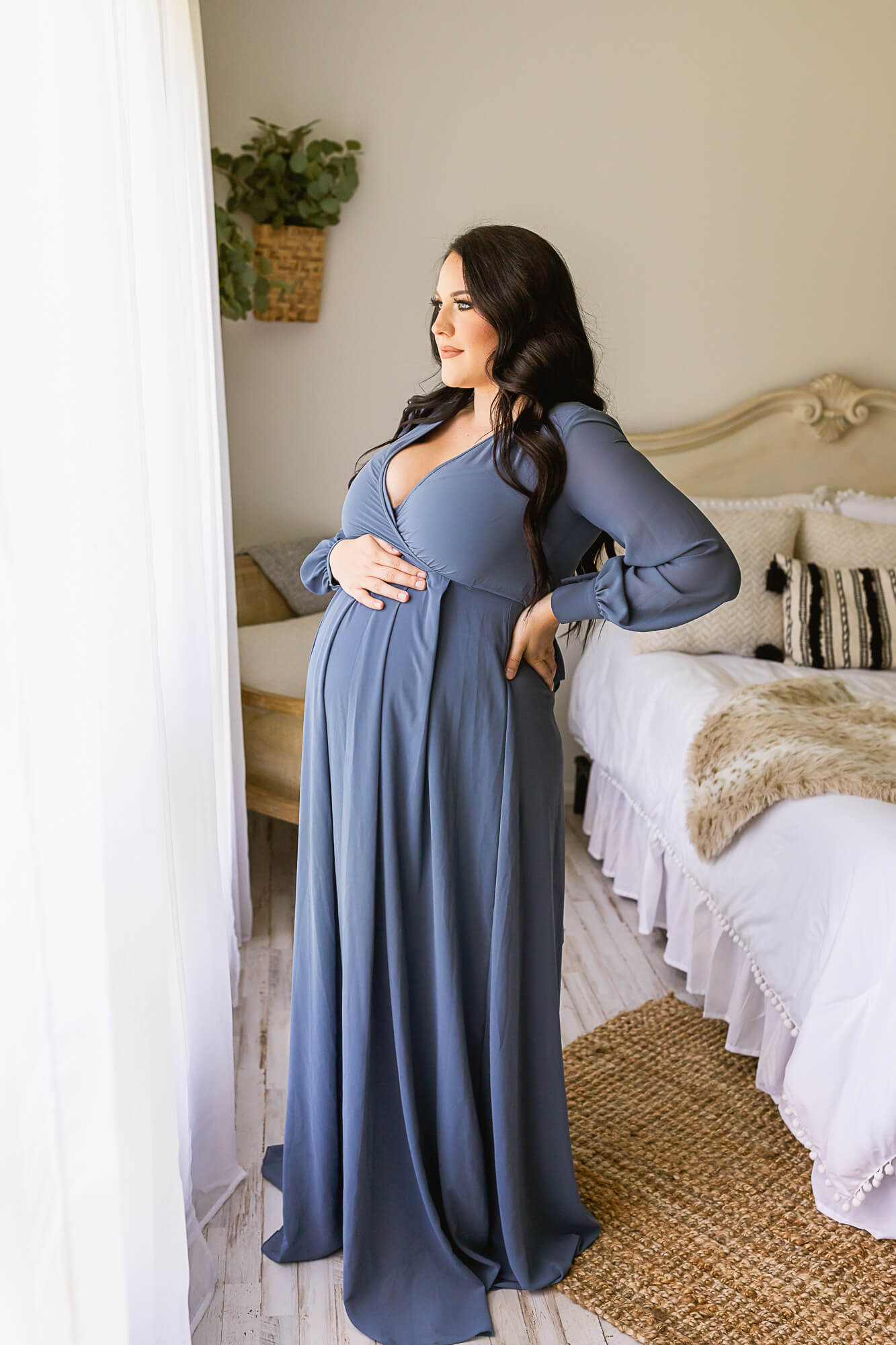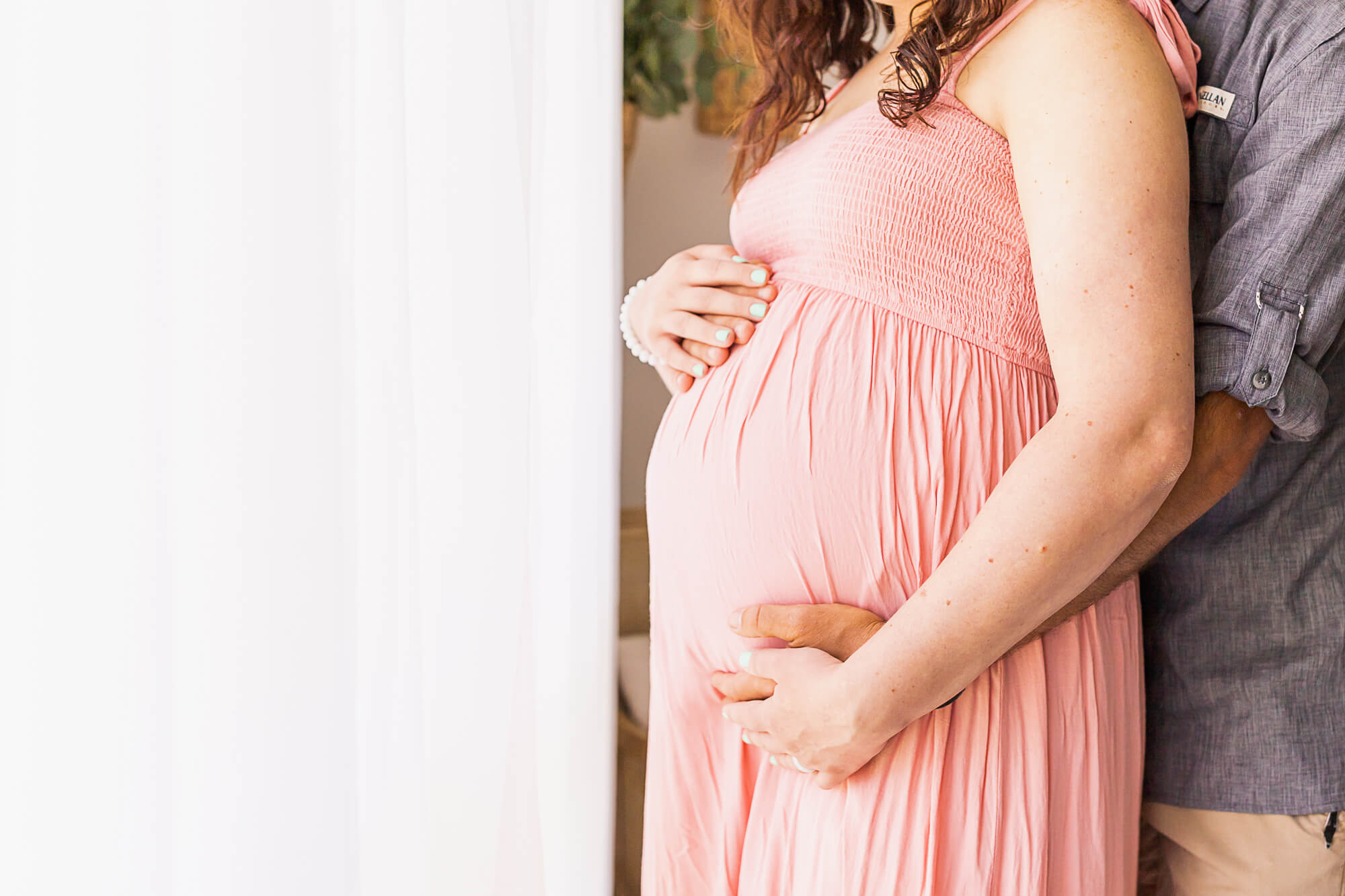If you are expecting, you may be considering hiring a Birmingham Doula. If you’re still in the consideration stage, there are likely lots of questions on your mind! What is a doula? What does having a doula look like? Who else do you need on your team throughout this pregnancy? As a Birmingham maternity photographer, I thought it was important to help moms-to-be find these answers easily. I reached out to Jeanna McNeil, a certified doula of By Design Birth Doula Services, and asked her several questions I thought were important.
Jeanna has been a doula for 5 years. By Design Birth Doula Services is her business that is based out of Birmingham, AL. She begins working with women as early as during planning to conceive! Below, you will see some frequently asked questions and the way Jeanna herself answered them!
Birmingham Doula Q&A
What exactly is a doula?
A doula is a person who goes alongside a woman to support her, not in a medical sense, but in every other facet (so – informationally, physically, sometimes spiritually) with one-on-one support through pregnancy (sometimes trying to conceive) and some period post-partum. The root word of doula is “servant.” We are there to serve our mother. We don’t put our own biases and opinions on them, we learn who they are as a unique person and try to find ways to support them. If we are hired for in-person support, help facilitate their wishes on their birth day.
What made you decide to become a Birmingham Doula?
I had a super cush desk job, made good money, never had to work weekends or nights, pretty much had it made in the shade, you know? My first birth with my daughter, I wanted a low intervention birth. I was about 37 weeks, not prepared, and thankfully this nosey girl was like, “Hey, I heard you’re interested in unmedicated birth. I know it’s hard to talk about it because people just shoot you down, so I just want to be that voice that tells you you can do it, but not doing what you’re doing – which is nothing.” She went alongside me, gave me information, taught me ways to prepare, and acted as my doula on my birth day and I did go on to have an unmedicated, low intervention, very empowering birth experience!
I just kept feeling this nudge to help women in some capacity and love on them and encourage and help them be empowered. At some point, I came across the doula training in Birmingham and kept feeling called to that. I really only did it to help people that I knew. During that time, I learned about the disparities in Alabama specifically. Less access to things, lower resources outside of hospital settings – I really had a heart for that to try and help women who may not have accessibility to a lot of things.
At that time I was still working remotely for my graphic design job. I was working 40 hours a week and still taking like 5 to 10 doula clients a year. I kept feeling called to step away from design work and go all in with birth work. May of last year, I was still feeling heavy and overwhelmed. I still had my design job part-time and was taking 25 births. I was like, “Lord, if there’s anything in my life keeping me from my purpose, please just let me understand, let me step away from it.” That was 10 or 11 in the morning. At 2 o’clock, I got an email from the company I worked for just saying, “Hey, we’ve re-evaluated and we’re not going to need your services at this time.” From that point forward, I really dove in 100% into serving women in our community.
What training/qualifications do you have?
Certifications can be great for red tape, when you need it to get in somewhere. But outside of that, I don’t feel like I’m a better doula than the next person who chose not to certify. But all that to say, I am DONA certified, Stillbirthday, I did Tens Unit for Doulaversity. Those are the main ones that I actually utilize. I am, all the time, looking at new studies and things that we need to learn about as support people.

What do you focus on as a Birmingham Doula?
To me, “healthy baby and healthy momma” is bare minimum. We need to build on that, not let that be our goal. Doulas are a wide range of service areas, but I focus on learning about a person uniquely. Not just their physical needs and how we get the baby out, but how they can walk away from it feeling good about the experience and feeling full. I’m really heavy on the teaching side. Teaching you how to have confidence in your birth no matter what type of birth you want.
How do you care for women prenatally?
I meet with people, in person, about 3 times prenatally. Early, around 34 weeks, and another one just somewhere in the middle. In the first one, we get to know each other. The second one, I go over how to get your body and your mind truly ready for labor based on your birth goals and specific health needs. Then the last one, I try to always invite whoever’s going to be their other support person into that meeting to be like, “Hey, there’s going to be a time before I get there where you’re the point guard. So, you need to know comfort measures, you need to know how to manage so you don’t make it worse, those type of things.”
All in between that time, I’m always available by text and email. Somebody might be reading something and be like, “Hey, delayed cord clamping. Why would I even wanna do that?” and so we chat about that electronically between meetings. It’s not just every now and then, it’s sometimes weekly. I really want to be available as much as a mom wants or needs to have that person to lean on.
I go on call at 38 weeks for everybody, unless there’s a high medical need. That means I don’t really go anywhere, I just hang around and wait on a phone call. As soon as they think they’re in labor, or if they’re going in for an induction, we stay in constant communication and we decide together when it’s time for me to go. Sometimes I meet with people in their home and labor with them there. If it’s a home birth, I just get there! I stay for the duration of the labor if I can. I’ve been to births as long as 36-38 hours.
How do you care for women postpartum?
Once the birth is over, I stay with them about an hour or two postpartum just to make sure they’re okay, their bleeding is under control, the baby’s trying to latch, all that stuff. Before I leave the birth space, I say, “Hey, remember, you’ve paid me a lot of money up until 6 weeks, utilize that. I’m here. If you’re baby’s feeding funky, if your nipples hurt, if your butt hurts, if you’re not understanding how to get your nutrition in, let me know and we’ll get you some help. Then I constantly check in, with the understand that moms may not get back to me immediately. I’m still checking in on people who gave birth a year ago. I feel like with my clients, it’s very personal. Almost like a friendship level, but still professional.
In what circumstances should someone choose to have a Birmingham Doula?
All of ’em. I mean, truly. I have OBs and nurses hire me all the time. If an OB feels like she needs a doula, that should tell us that realistically anybody can benefit from having one. My place is never to take the place of any other support person, but really to facilitate them being a part of the experience.
As a doula, I was pregnant and asked my doula to come and my husband was like, “Isn’t that what you do?” I was like, “Listen, at some point, I will be out of my thinking mind, and I cannot manage all of that and still try to bring forth a life. I don’t want you to have all the stress on your shoulders and making a decision that I’m not interested in. I need a non-biased person in our space, to look to my needs constantly, and then also remind me the things that are important to me when anything comes up so that I don’t induce any additional trauma that’s unnecessary or agree to things that realistically I wouldn’t have if I weren’t under fluorescent lights with like 12 people staring at me.”
What is the difference between a midwife and a doula?
Midwives are medical providers; doulas are not medical providers.
Should someone who is expecting have an OB, midwife, and a doula?
I think it’s really important to bring light to those options. Not all home births are legal right now. If you have a VBAC or twins, midwives that are licensed can’t technically attend your birth with their licensing. I have clients who do what’s called shadow care. They’ll hire a midwife for their care, but they also have to go see an OB because their birth will be in a hospital. So, it’s collaborative care. Then either [the midwife] can act as your doula when you go in to have labor with your OB, or you can have a separate doula outside of that to go in with you for your birth.
People who have home births sometimes also choose to see an OB, just in case. So if they’re having a home birth and there’s any risk of transfer, they will have already seen this doctor prenatally. If an epidural gets on board, an OB has to be on the floor. If it’s an induction, an OB has to be nearby. For any type of an intervention, they have to be there.
Some people do attend free births. That means you have no medical provider. I don’t personally do that, I only take people with medical providers. If you have a midwife, should you have a doula? Yes, because a midwife is probably going to look a lot more to your overall needs than maybe an OB would, there’s still not that one-on-one everyday support that a doula would do. When I do home birth with a midwife, I usually arrive first and there for a much longer span of time. I’m usually the one to say, “Hey, it’s time to call the midwife.”
Do you work with a specific Midwife or OB?
I have some midwives that I work with a bunch. I do attend most of my births in the hospital. Most of those are at Princeton and there’s 3 providers there that I work pretty closely with. Dr. Cooper in Simon-Williamson is the one I work with the most because so many of my clients go there. Also, Dr. Yocunda Clayton at ARMS is another one that has seen a lot of my clients. Her patients have all been people that work in a hospital setting. 2 OBs and 3 L&D nurses that I’ve served were all Dr. Clayton’s patients.
How do you handle situations where a birth plan needs to be altered?
Prenatally, I try to encourage clients to put something together I call a birth and infant care plan so that we understand what her preferences are for some of those things and what alternatives there are for that if the situation changes. I always say, if your birth goes ideally, just everything you want, let’s talk about that. I want you to hang onto it, but with open hands, because birth is birth and things change.
As they change, if it’s not an emergent situation, it’s my role to say, “Hey. Here’s what we’re looking at. Here are the benefits, here are the risks, here are the alternatives. Do you need a couple minutes to think about it? Let’s move from there.” Some people get married to their birth plan, and it doesn’t go that way and then they freak out. So I’ll always try to say that we may have to make some modifications, but we’re going to talk through it and it’s still going to be okay. I try to take some of the shock off as I see things happen.
Do you have recommendations for other professionals to have on hand?
My personal recommendation for an ideal team is a doula, a healthcare provider (whether that’s a midwife or an OB who is centered and understands your goals), a Webster certified chiropractor, pelvic floor physical therapist, lactation consultant (ideally someone who can come into your home that accepts insurance), and a nutritionist to at least get one evaluation from.
Where do you service?
I do try to stay local, within a 30 mile range. But, I do about an hour to maybe two hour range if it’s special circumstances.
What is the investment?
Right now, my gold package for a first time mom or someone who’s having a doula for the first time is $1200. I ask for half up front to save a place on my calendar. A non-refundable deposit, except for the case of demise. I do not hold somebody’s money if that happens. The remainder is due at 36 weeks. Sometimes people will do two payments, some will do one, some will pay all throughout as long as it’s paid by 36 weeks.

Birmingham Doula FAQs
Choosing a Birmingham Doula can definitely help you take ease in your journey. I sure hope these answers have helped you learn more about the many benefits! If you’ve decided that you cannot take one more step towards your due date without a doula, reach out to Jeanna McNeil! The best ways to contact her are via her website or email, which is on her contact page.
Are you looking for more motherhood content in the Birmingham area? Click on the blogs below!
